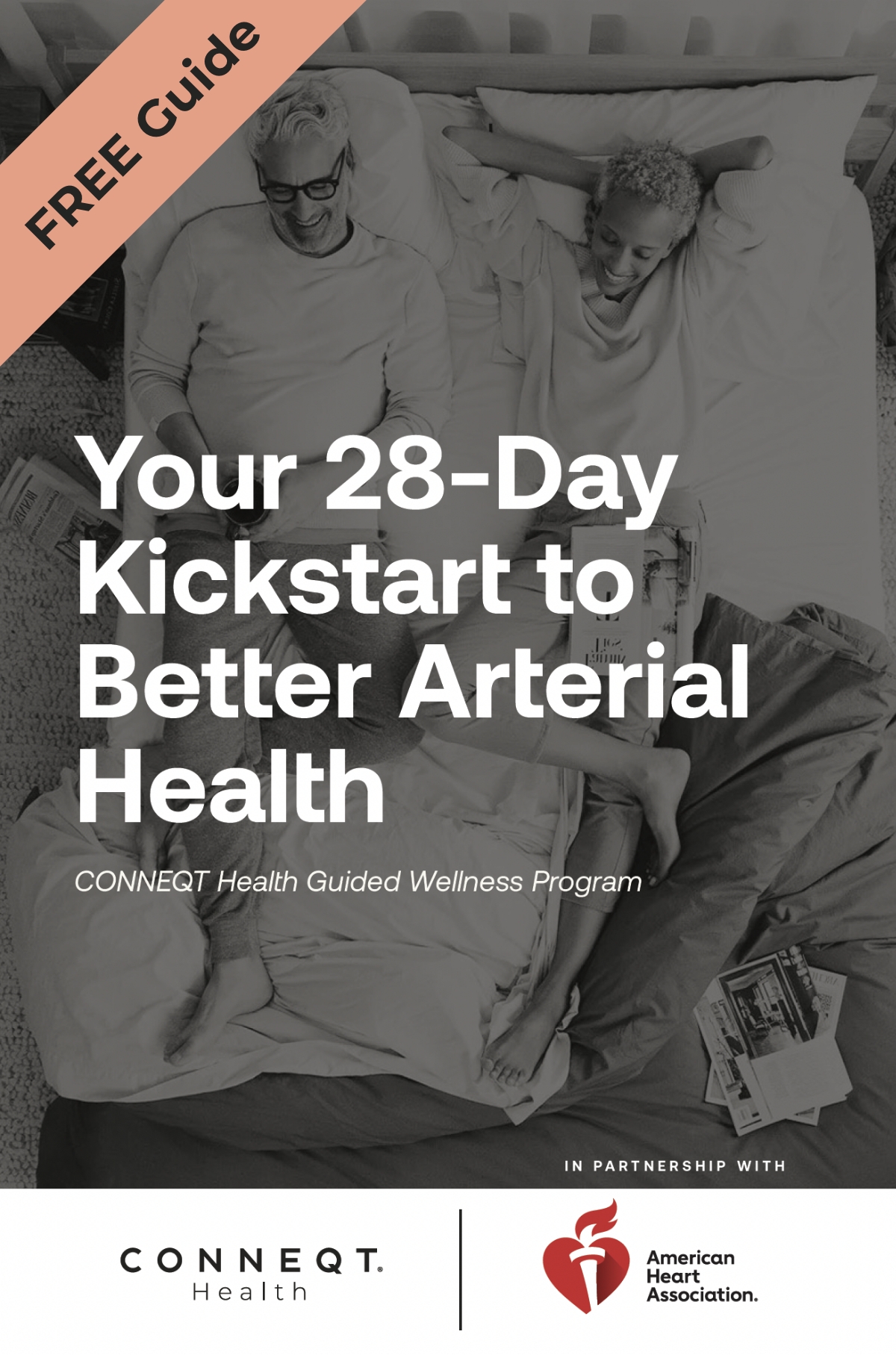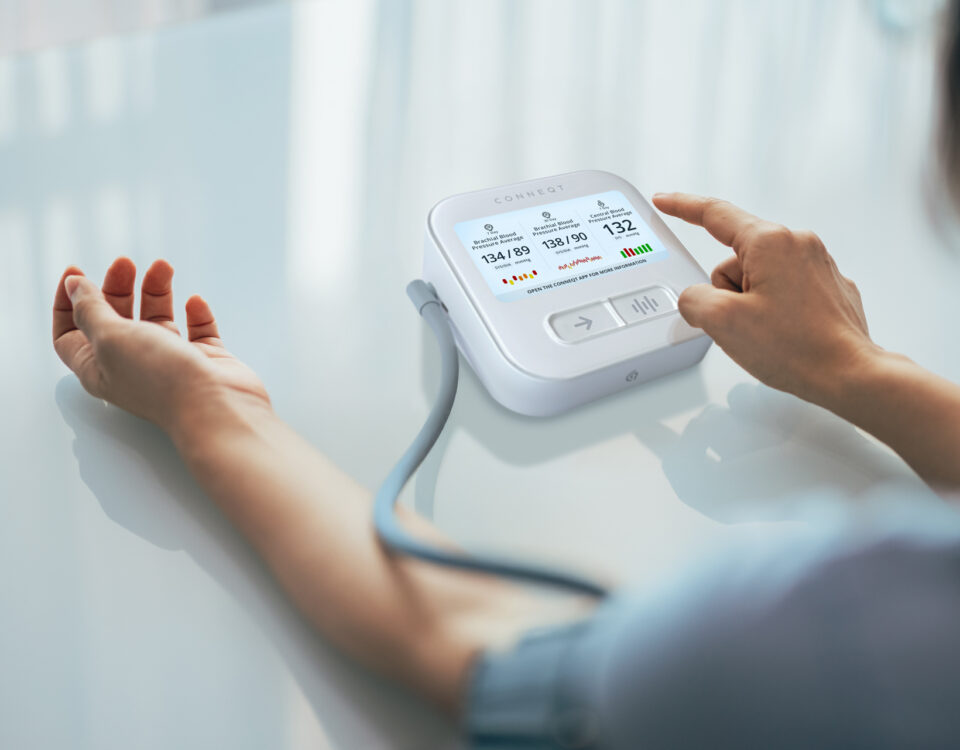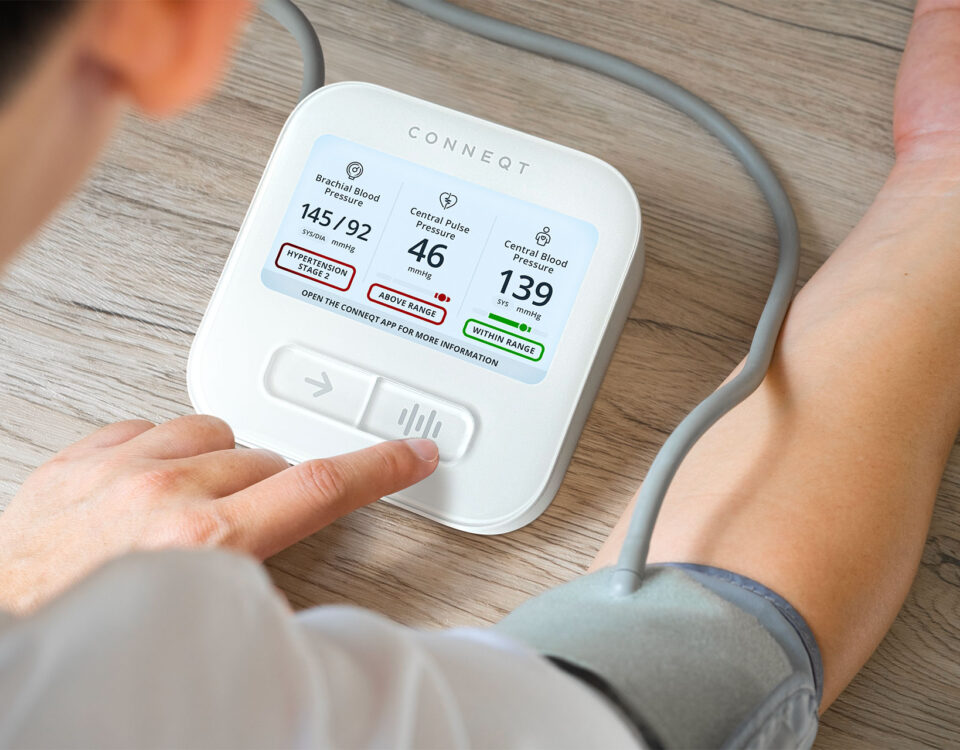In a Heartbeat:
- What Are AP and AIx? Augmentation pressure (AP) is the additional pressure your heart needs to pump against because of arterial stiffness. Augmentation index (AIx) is the percentage of effort your heart must work against due to this added pressure. Both are a result of arterial stiffness.
- Why Do They Matter? AP and AIx provide early insights into arterial stiffness, a key marker of cardiovascular health that often precedes plaque formation and coronary artery disease, including before coronary artery calcification develops.
- How Are They Measured? The CONNEQT Pulse uses pulse wave analysis (PWA) to assess AP, AIx, and other vascular biomarkers, offering a comprehensive view of your arterial health.
- Actionable Insights: Regularly monitoring AP and AIx helps track arterial stiffness over time, enabling early interventions to reduce your cardiovascular risk.
- What This Means for You: Measuring arterial stiffness with AP and AIx offers a valuable opportunity to detect cardiovascular risk early, often before heart disease develops. With non-invasive tools like the CONNEQT Pulse, these metrics empower you to take control of your heart health through effective lifestyle changes and medical therapies.
What Are Augmentation Pressure (AP) and Augmentation Index (AIx)?
Augmentation pressure (AP) and Augmentation index (AIx) are critical measurements used to assess the stiffness of your arteries and the additional workload on your heart. When your heart pumps blood through your arteries, it creates a pressure wave. In healthy arteries, this wave flows forward and smoothly (green arrow), but in stiffer arteries, part of the wave reflects back toward the heart (purple arrow).
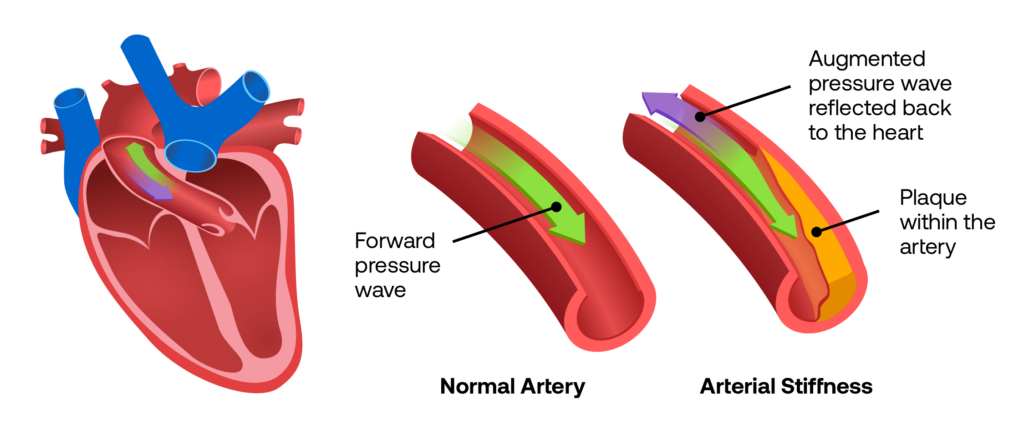
This reflected wave creates extra pressure, known as Augmentation pressure (AP), making your heart work harder to pump blood. Augmentation index (AIx) is the percentage of your total blood pressure that comes from this extra reflected pressure. The higher the AP or AIx, the more strain arterial stiffness is placing on your heart.
In simple terms:
- AP is the additional “push” your heart needs to pump blood because of stiff arteries, like how a pump has to work harder to move water through narrow pipes.
- AIx tells you how much of your heart’s total effort is due to that extra push.
Why Are These Measurements Important?
AP and AIx provide essential insights into your cardiovascular health by revealing how much extra work your heart is doing due to arterial stiffness. As arteries lose their elasticity, your heart must generate more pressure to pump blood efficiently. This added strain increases the risk of cardiovascular conditions such as high blood pressure, heart disease, and even heart failure.
By regularly monitoring AP and AIx, healthcare providers can evaluate how much your arteries are stiffening over time and whether lifestyle changes or treatments are needed to reduce your risk of serious heart conditions. This makes AP and AIx crucial tools for early detection and management of cardiovascular health.
How Are AP and AIx Measured?
The CONNEQT Pulse uses advanced, non-invasive technology, powered by SphygmoCor® technology, to measure AP, AIx, and other important arterial biomarkers. These measurements are performed using pulse wave analysis (PWA), which estimates the pressure in your arteries by capturing the waveforms generated with each heartbeat.
Traditional blood pressure monitors only provide general blood pressure measurements in the arm. The CONNEQT Pulse offers a more comprehensive view of your cardiovascular health. It includes arterial stiffness indicators like AP and AIx, which directly impact the heart’s function.
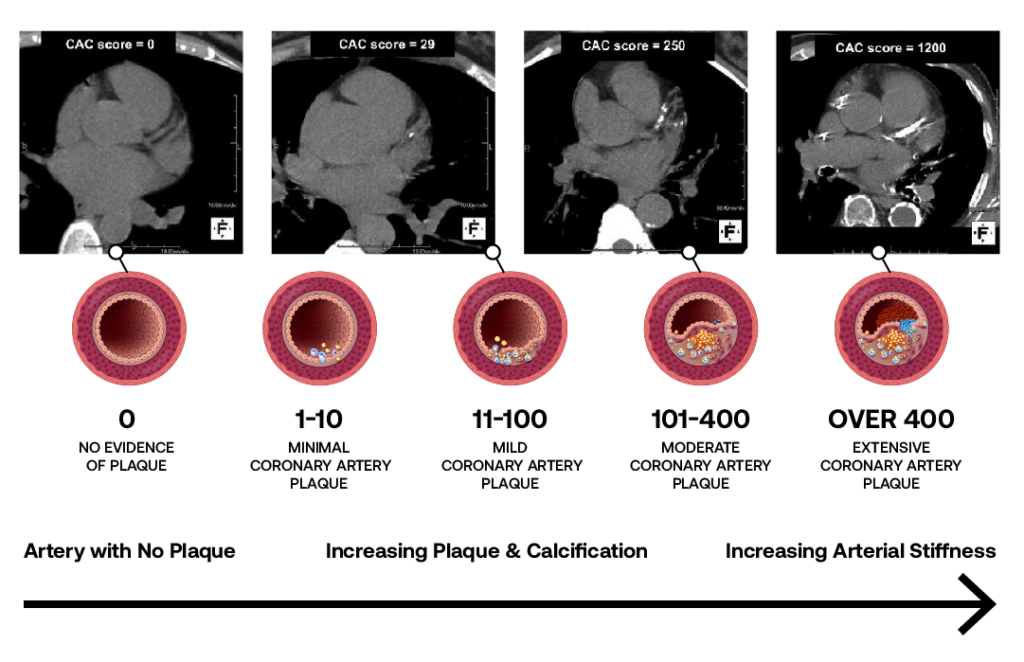
Image Source: Cleveland Clinic. Calcium Score Test: Understanding Coronary Artery Calcium Scores.
Understanding Arterial Stiffness (AP/AIx) and Coronary Artery Calcium (CAC) on a CT scan

AP and AIx provide ongoing insights into your arterial stiffness, allowing you to track changes over time. In contrast, a CAC scan gives a one-time snapshot of calcified plaque in your arteries, often after significant stiffening has already occurred.
For example, a person who has a CAC score of 0 (meaning no hardened plaque) may still have arterial stiffness that is detected on the CONNEQT Pulse. Arterial stiffness itself is associated with a higher cardiovascular risk of a heart attack or stroke. Such a person would benefit from additional tests and treatments that would not have been done based on a just a CAC score of 0. Detecting arterial stiffness leads to earlier prevention to reduce plaque before it develops, and to reduce cardiovascular risk.
What Do My AP and AIx Results Mean?
Your AP and AIx results are categorized into ranges that are personalized to your individual health profile. These ranges help you better understand how your results compare to a healthy population without cardiovascular disease, providing important context for your cardiovascular health.
The reference ranges displayed on your Pulse are based on the Anglo-Cardiff Collaborative Trial (ACCT), a landmark study conducted by Cambridge University that examined vascular health in thousands of participants. This research provides a detailed picture of how arteries naturally age over time and serves as the foundation for interpreting your results.
We’ve known that arteries age along a normal course of time. What we now know is that some people’s arteries age normally over time, some people’s arteries age faster (known as accelerated vascular aging), and some people’s arteries age slowly and remain healthy (known as delayed vascular aging).
In simple terms:
- Accelerated vascular aging can lead to arterial stiffness and cardiovascular disease that occurs earlier at a younger age.
- Delayed vascular aging is a healthier cardiovascular system over a longer period of time.
CONNEQT Pulse measures vascular aging within these AP and AIx categories:
- Below Range: If your AP or AIx is below the established normal range, it suggests that your arteries remain elastic and arterial stiffness may not be present. Below range is known as delayed vascular aging. It means that your arteries are functioning well and aging more slowly than the normal time course, which is beneficial for your cardiovascular health. Maintaining this healthy state is advantageous, and pursuing heart-healthy habits can help you continue supporting your vascular health.
- Within Range: If your AP or AIx is within the normal range, it means that your arteries are functioning well and aging along a natural time course. This range is normal and expected for your age. While being within range can be a positive sign of cardiovascular health, it’s still important to pursue healthy lifestyle choices such as regular physical activity, a heart-healthy diet, and stress management.
- Above Range: If your AP or AIx is above the established normal range, it suggests that arterial stiffness may be present. Above range is known as accelerated vascular aging. This means that arterial stiffness may have developed sooner than expected for your age, which could put you at high cardiovascular risk. Readings in this range should be discussed with your physician to assess your cardiovascular health and explore tests and treatments to reduce your cardiovascular risk.
By regularly monitoring these values, you can keep track of your arterial health and take proactive steps to maintain or improve it over time. The Pulse provides a reliable benchmark to help guide your health decisions and support your long-term cardiovascular well-being.
How Do I Improve My Arterial Health and Lower My AP and AIx?
Improving arterial health by lowering your Augmentation pressure (AP) and Augmentation index (AIx) requires a comprehensive approach to target arterial stiffness. Below are actionable strategies:
- Follow an Anti-Inflammatory Diet: Adopt a Mediterranean diet rich in vegetables, fruits, nuts, seeds, whole grains, and lean proteins to support arterial health. Prioritize a variety of fruits and vegetables daily to increase potassium intake and boost vascular health—small changes, like adding an extra serving to each meal, can make a big difference. Include omega-3-rich foods like salmon and flaxseeds, and minimize processed foods, refined sugars, and trans fats. Foods like beets, spinach, and citrus fruits enhance nitric oxide levels, promoting arterial relaxation. A diverse diet also supports a healthy gut microbiome, which reduces inflammation.
- Supplement Strategically: Use magnesium (200–400 mg/day) to improve vascular tone and CoQ10 (100–200 mg/day) to reduce oxidative stress. L-arginine and L-citrulline enhance nitric oxide production, while Vitamin D and K2 prevent arterial calcification. Potassium-rich foods or supplements can further support blood pressure regulation.
- Start a Targeted Exercise Plan: Perform 30–60 minutes of moderate aerobic exercise 4–5 times per week, such as brisk walking, swimming, or cycling. Include resistance training 2–3 times weekly and add 1–2 high-intensity interval training (HIIT) sessions for maximum cardiovascular benefits.
- Maintain a Healthy Weight: Excess weight contributes to arterial stiffness. Focus on gradual, sustainable weight loss through a balanced diet and regular exercise.
- Prioritize Stress Reduction: Manage stress with mindfulness, yoga, or deep breathing to lower cortisol and improve vascular health. Consider heart rate variability (HRV) tracking to optimize stress responses.
- Monitor and Improve Blood Pressure: Regularly track AP, AIx, and blood pressure using the CONNEQT Pulse to identify trends and adjust medical therapies as needed. The combination of dietary changes, stress management, and exercise with medication can improve your blood pressure and arterial health.
- Address Metabolic Health: Balance blood sugar by focusing on nutrient-dense foods, reducing sugar intake, and maintaining regular physical activity. Improve cholesterol and triglycerides by incorporating more fiber and plant sterols into your diet.
- Quit Smoking and Limit Alcohol: Smoking significantly stiffens arteries, making cessation one of the most effective steps for improving vascular health. To reduce cardiovascular risks, limit alcohol to within recommended guidelines: 1 drink per day for women and up to 2 for men.
- Optimize Sleep: Sleep 7–9 hours per night to support vascular repair and regulate stress hormones.
- Personalized Testing and Care: Use the Pulse alongside other advanced tests (e.g., inflammation markers or lipid panels) to tailor a plan addressing your unique cardiovascular profile.
By implementing these strategies and monitoring progress with the Pulse, you can proactively reduce arterial stiffness and improve your long-term heart health.
Empowering Your Heart Health Journey
By using the CONNEQT Pulse to monitor your AIx and AP, you can take control of your cardiovascular health from the comfort of your home. Regular monitoring of these key indicators gives you the tools to make informed decisions about your lifestyle, treatments, and overall heart health. With the world’s most advanced personal arterial health monitor, you’re empowered to protect your heart and reduce the risks of serious cardiovascular conditions.




